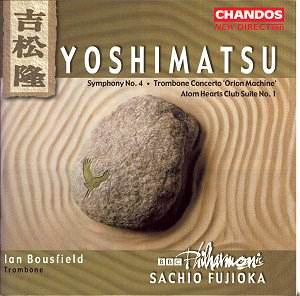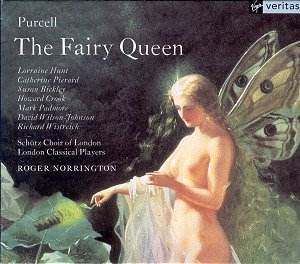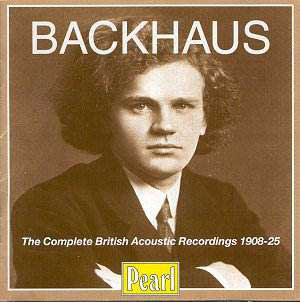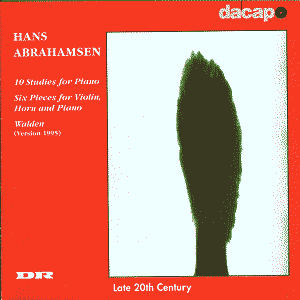 Composer: Takashi Yoshimatsu
Composer: Takashi Yoshimatsu
Works: Symphony No. 4 Op. 82 (2000), Trombone Concerto “Orion Machine” Op. 55 (1993), Atom Hearts Club Suite No. 1 Op. 70b (1997/2000)
Performers: Ian Bousfield, trombone; BBC Philharmonic Orchestra; Sachio Fujioka, conductor
Recording: Studio 7, New Broadcasting House, Manchester, March 2001
Label: Chandos CHAN 9960 DDD [61:22]
Takashi Yoshimatsu, a composer who deftly navigates the intersections of contemporary classical music and popular idioms, presents a compelling collection of works in this latest Chandos release. His Symphony No. 4, described as a “pastoral toy symphony,” reflects a childlike wonder married to the complexities of modern life—themes that resonate through the verdant imagery of springtime and the exuberance of youthful play. This contrasts with the darker undertones that Yoshimatsu initially envisioned, revealing an artist whose creative impulses have evolved into a more optimistic vision.
The performance led by Sachio Fujioka showcases the BBC Philharmonic Orchestra’s deftness across the Symphony’s four movements. The opening movement is marked by a buoyant woodwind theme that dances throughout, allowing for a variety of rhythmic transformations. Here, one can perceive echoes of film score aesthetics, particularly in the heartfelt string melody reminiscent of the lush orchestrations found in scores like “Out of Africa.” This thematic development captures the listener’s attention with its accessibility while hinting at more complex structures lurking beneath the surface. The interplay between light-heartedness and rhythmic drive, influenced by rock music, is a testament to Yoshimatsu’s ability to synthesize diverse genres into a coherent symphonic narrative.
As the symphony progresses into the scherzo—characterized as a distorted waltz—Yoshimatsu cleverly weaves a tapestry of familiar melodies, invoking the spirits of English light music alongside grandmasters like Berlioz and Mahler. This intertextuality enriches the work, creating a delightful pastiche that honors the traditions of symphonic writing while playfully subverting them. Similarly, the third movement, an Adagietto, unfolds with lyrical grace, introducing a music box-like piano motif that further elevates the emotional landscape. The finale, pulsating with rhythmic urgency, revisits the opening theme, culminating in a celebratory and frenzied conclusion that leaves the listener uplifted.
Turning to the Trombone Concerto “Orion Machine,” composed for the talented Ian Bousfield, this work highlights Yoshimatsu’s profound understanding of instrumental characteristics. The concerto’s five movements ingeniously parallel the stars of the Orion constellation, which not only imbues the piece with a cosmic narrative but also invites a wide range of emotional expression. Bousfield’s performance is nothing short of extraordinary, navigating the technical demands with flair and precision, particularly during the extended cadenza in “Saiph,” where he adeptly showcases a variety of extended techniques that push the trombone’s capabilities to new heights. The orchestral accompaniment, featuring a quasi-solo section of piano, harp, and percussion, creates a textured landscape that complements the soloist without overwhelming him.
The Atom Hearts Club Suite No. 1, replete with rock influences, presents a more whimsical side of Yoshimatsu’s oeuvre. Drawing inspiration from iconic bands of the 1970s, the suite’s rhythmic drive and irregular meters evoke a playful homage to its namesake, while the boogie-woogie finale adds a cheeky touch that contrasts with the more earnest symphonic works. While some may perceive this as mere “light music,” the infectious energy and rhythmic vitality are undeniably engaging, showcasing Yoshimatsu’s ability to blend genres seamlessly.
The recording quality is outstanding, with Chandos capturing the orchestra’s rich sound palette in a manner that is both transparent and immersive. Every detail, from the subtleties of the woodwinds to the robust brass sections, is rendered with admirable clarity, allowing the listener to appreciate the intricate orchestration that defines Yoshimatsu’s style.
Yoshimatsu’s works in this collection serve as a testament to his unique voice in contemporary classical music, balancing accessibility with sophistication. His ability to draw upon popular musical idioms while creating substantive orchestral works positions him as a significant figure in the current musical landscape. This disc not only showcases the technical prowess of the performers but also invites listeners into a vibrant world where classical music can embrace the playful and the poignant with equal measure.



